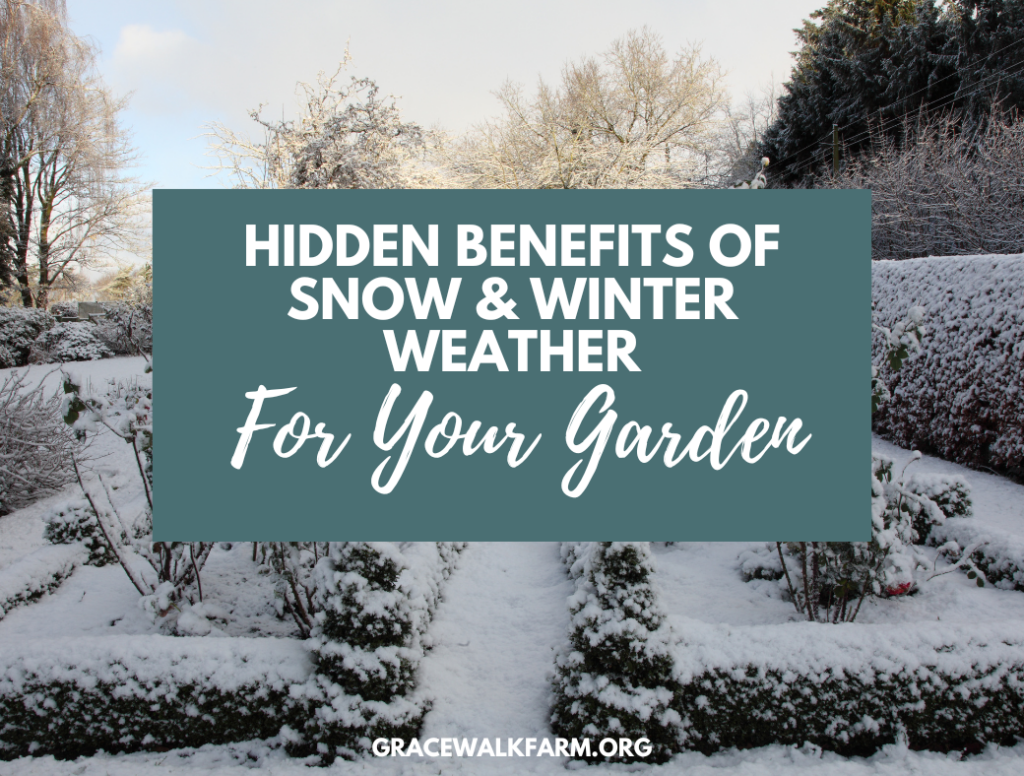When winter arrives and snow blankets the ground, many gardeners assume that the growing season has ended. But did you know that snow and winter weather can actually benefit your garden? Far from being a hindrance, the cold season plays a crucial role in preparing your garden for spring, protecting plants, and enhancing soil fertility.
In this post, we’ll explore the surprising advantages of snow and winter weather for your garden and how to maximize these benefits for healthier, more productive plants. If you’re already tired of the snow and longing for seed starting season, maybe this will give you a little hope to hang in until the cold weather passes and spring begins.
Welcome to Grace Walk Farm, our family homestead in western NC. We share the highs and lows of our homestead journey, in hopes that it will encourage you to grow your own food too. Click here to grab our Beginner Garden Guide for free! Join our 600K strong Instagram community of homesteaders here. Thanks for stopping by!
Snow Acts as a Natural Insulator
One of the most overlooked benefits of snow is its ability to insulate the ground. A thick layer of snow acts like a thermal blanket, maintaining soil temperatures and shielding plant roots and microorganisms from extreme cold.
- How It Works: Snow traps air between its layers, reducing heat loss from the soil and preventing frost from penetrating too deeply. This creates a more stable environment for overwintering plants and beneficial microbes.
- Key Tip: Allow snow to accumulate over garden beds. Avoid shoveling it away unnecessarily, as this natural insulation can protect perennials and bulbs from freezing temperatures.
Snow Adds Essential Moisture to the Garden
As snow melts, it provides a steady and gradual supply of moisture to the soil. Unlike heavy rainfalls, which can lead to surface runoff, snow delivers water slowly, allowing the soil to absorb it effectively.
- Benefits: This slow-release irrigation ensures that the soil is well-hydrated, which is particularly important in arid or drought-prone regions.
- Pro Tip: If your garden is prone to soil erosion, snow can help minimize damage by providing moisture without disturbing the soil structure.
Winter Weather Kills Garden Pests and Diseases
Harsh winter temperatures can help control garden pests and diseases that might otherwise thrive and spread. Many insect larvae, eggs, and pathogens cannot survive prolonged exposure to freezing conditions.
- Examples: Pests like aphids, whiteflies, and certain soil-borne pathogens are significantly reduced during cold winters.
- Gardening Advice: Avoid disturbing the soil too much in late fall to expose pest eggs and larvae to freezing temperatures.
Snow Enriches the Soil
As snow falls, it captures nutrients from the atmosphere, such as nitrogen. When the snow melts, these nutrients are deposited into the soil, enriching it and promoting healthy plant growth in spring.
- The Science: Snow, sometimes referred to as “poor man’s fertilizer,” carries small amounts of nitrogen and other compounds that act as natural fertilizers.
- Enhancement Tip: Allow snow to melt naturally over your garden beds to maximize nutrient absorption.
Winter Weather Offers Rest and Recovery to the Soil
Winter allows plants to enter a period of dormancy, conserving energy and focusing on root development. This rest phase is essential for the long-term health and productivity of many perennials, shrubs, and trees.
- Why It Matters: Without this downtime, plants may become stressed and produce weaker growth in subsequent seasons.
- Tip for Gardeners: Avoid over-pruning or fertilizing during the fall to encourage natural dormancy in your plants.
Frost Improves Soil Structure for Healthier Plants
Freezing and thawing cycles during winter can naturally break up compacted soil, improving its structure and drainage.
- How It Helps: As water within the soil freezes and expands, it creates small pockets that loosen compacted areas, making the soil more aerated and ready for spring planting.
- What to Do: Incorporate organic matter in the fall to enhance this natural process and further improve soil quality.
Winter is the Perfect Time for Garden Planning
The quiet season provides an opportunity to reflect on the previous growing season and plan for the year ahead. Use this time to research plants, design layouts, and order seeds for spring.
- Ideas for Planning:
- Sketch out new garden designs.
- Study cold-hardy plants for your region.
- Experiment with winter sowing techniques for certain seeds.
Snow Protects Evergreen Plants
Evergreens can suffer from desiccation caused by cold, dry winds in winter. A layer of snow provides a protective barrier that helps retain moisture in the foliage.
- Key Benefit: Snow acts as a shield, reducing water loss and preventing winter burn.
- Gardener’s Note: If heavy snow accumulates, gently brush it off to avoid breakage but leave lighter layers intact for protection.
Winter Shelter for Wildlife
Winter gardens can serve as a haven for wildlife and pollinators. Snow-covered plants and trees provide shelter, while seed heads left on perennials can offer food.
- Wildlife-Friendly Tips:
- Leave seed-bearing plants like coneflowers and sunflowers untrimmed until spring.
- Add bird feeders to supplement food sources for overwintering birds.
Winter Exposure Creates Stronger Plants
Exposure to cold weather can help certain plants build resilience, making them better adapted to future conditions. This is especially true for cold-hardy vegetables like kale, Brussels sprouts, and garlic, which thrive in cooler temperatures.
- Gardener’s Action Plan: Experiment with overwintering crops to take advantage of this benefit. Mulch these plants for added protection.
How to Prepare Your Garden for Winter Benefits
To maximize the advantages of snow and winter weather for your garden, take these simple steps:
- Mulch Early: Apply a layer of organic mulch in late fall to protect soil and roots.
- Leave the Leaves: Allow some fallen leaves to remain in garden beds as a natural insulator and habitat for beneficial insects.
- Water Well: Ensure plants are well-watered before the ground freezes to prevent winter drought.
- Avoid Over-Clearing: Resist the urge to remove all plant debris, as it can provide additional protection and nutrients.
Embrace Winter for a Healthier Garden
Winter weather, including snow, is not the enemy of gardeners—it’s an ally. From insulating the soil to enriching nutrients, controlling pests, and fostering plant dormancy, the cold season offers countless benefits that set the stage for a thriving spring garden.
By understanding and embracing these natural processes, you can make the most of winter’s gifts and ensure your garden’s health and productivity year after year.
Remember: Gardening is a year-round endeavor. Even when the ground is frozen, nature is working behind the scenes to prepare your plants and soil for the growing season ahead.
Imagine stepping outside into your own backyard and picking fresh, ripe strawberries to enjoy with your family and friends. Imagine having the knowledge and skills to grow your own food, even if you’ve never gardened before.
With “Grow Food: Backyard Gardening 101,” this can be your reality.
Also check out these blogs:
- Winter Gardening: Hacks to Keep Your Green Thumb Warm and Your Organic Garden Thriving
- How to Make Tinctures: Preserved Medicinal Herbs in Liquid Form
- How to Make a Lemon Balm Tincture
- 10 Herbs for Hormone Imbalances
- Beginner’s Guide to Using Medicinal Herbs at Home
- Uncover the Practical Benefits of Medicinal Herbs




